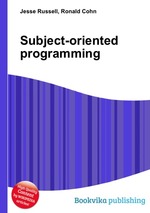Subject-oriented programming
Jesse Russell Ronald Cohn
бумажная книга
High Quality Content by WIKIPEDIA articles! In computing, Subject-Oriented Programming is an object-oriented software paradigm in which the state (fields) and behavior (methods) of objects are not seen as intrinsic to the objects themselves, but are provided by various subjective perceptions (“subjects”) of the objects. The term and concepts were first published in September 1993 in a conference paper which was later recognized as being one of the three most influential papers to be presented at the conference between 1986 and 1996. As illustrated in that paper, an analogy is made with the contrast between the philosophical views of Plato and Kant with respect to the characteristics of “real” objects, but applied to software ones. For example, while we may all perceive a tree as having a measurable height, weight, leaf-mass, etc., from the point-of view of a bird, a tree may also have measures of relative value for food or nesting purposes, or from the point-of-view of a tax-assessor, it may have a certain taxable value in a given year. Neither the bird’s nor the tax-assessor’s additional state information need be seen as intrinsic to the tree, but are added by the perceptions of the bird and tax-assessor, and from Kant’s analysis, the same may be true even of characteristics we think of as intrinsic.


